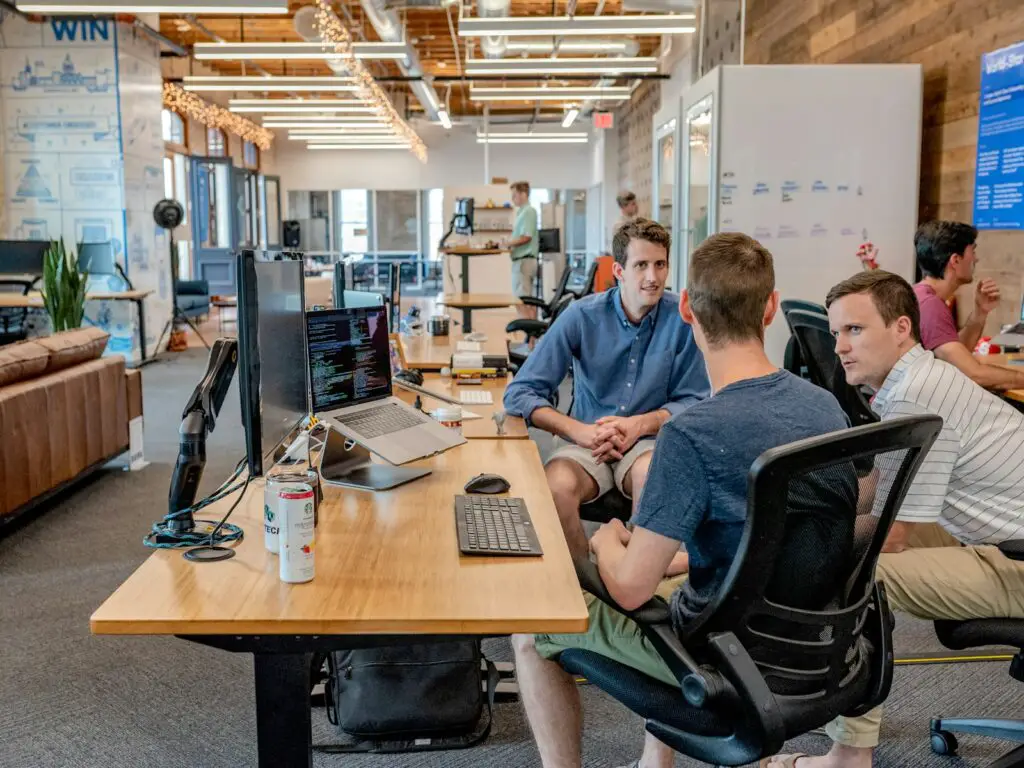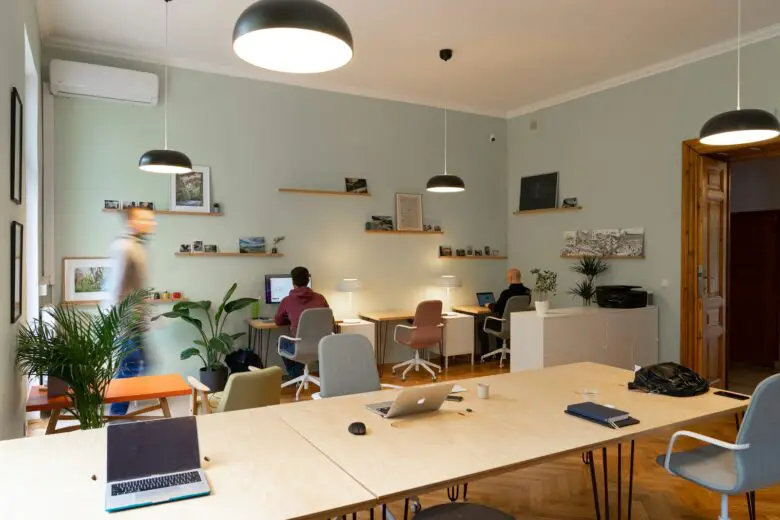Imagine sipping your morning coffee in a vibrant, open-plan workspace, surrounded by other freelancers typing away on their latest projects. Co-working spaces, a symbol of the gig economy, have burgeoned as the freelancers’ haven, offering a hybrid between a bustling coffee shop and a traditional office environment. Yet, for all their rising popularity, such shared spaces come tagged with a unique set of benefits and risks that can make or break a freelancer’s productivity and professional journey.
From the camaraderie of joint coffee breaks to the spontaneous brainstorming sessions, co-working spaces create a community that can often be absent in the solitary life of a freelancer. Networking events transform these hubs into fertile grounds for collaboration, while regular social interactions bolster a sense of belonging, potentially leading to successful partnerships. However, this new way of working is not devoid of challenges, particularly in maintaining the delicate balance between professional openness and personal boundaries.
This article ventures into the novel world of co-working spaces as seen through the lens of a freelancer, dissecting the pros and cons of giving up the private office. We will explore how these shared spaces can shape one’s work routine, impact mental health, and assist in creating meaningful professional networks. Finally, we’ll provide insights on how to navigate the myriad of co-working options, ensuring every freelancer can make an informed choice tailored to their needs. Join us as we unpack the complex dynamics of co-working spaces—their potential to revolutionize work and the caution needed to flourish within them.
Navigating the Dynamics of Co-Working Spaces for Freelancers
Co-working spaces function as shared workspaces where freelancers, entrepreneurs, and remote workers come together to work independently or collaboratively. These spaces provide a range of amenities and services designed to meet the diverse needs of their occupants.
Membership Options: Most co-working spaces offer different membership options to cater to the specific requirements of freelancers. From part-time access to 24/7 unlimited usage, freelancers can choose the membership plan that suits their schedule and budget.
Flexibility: One of the biggest advantages of co-working spaces is the flexibility they offer. Freelancers can choose where and when they want to work. Whether it’s collaborating with others in communal areas or finding solitude in private meeting rooms, co-working spaces provide freelancers with the freedom to work however they prefer.
Amenities and Services: Co-working spaces are known for their extensive list of amenities and services. These can include high-speed internet, conference rooms, printing and scanning facilities, mail handling, on-site cafes or kitchens, wellness areas, lounge spaces, and even professional development workshops and events. Access to these amenities can enhance a freelancer’s productivity and efficiency.
Community and Networking: Perhaps one of the biggest draws of co-working spaces

Who Benefits From Coworking Spaces?
- Freelancers: Co-working spaces are especially beneficial for freelancers. These spaces provide an opportunity to escape the isolation often associated with working from home. Freelancers can enjoy the sense of community and collaboration that comes with working alongside other like-minded professionals. Moreover, co-working spaces offer a more professional and credible image for freelancers when meeting with clients.
- Entrepreneurs: Co-working spaces are a haven for entrepreneurs who are just starting their ventures. These spaces provide a supportive and collaborative environment where entrepreneurs can learn from experienced professionals and connect with potential investors. Additionally, the flexible lease options and access to office amenities make co-working spaces an attractive option for early-stage businesses.
- Remote Workers: Many companies allow their employees to work remotely, and co-working spaces offer them a professional and productive environment away from home. Remote workers can have access to reliable Wi-Fi, meeting rooms for video conferences, and the chance to network with professionals from various industries.
- Digital Nomads: Co-working spaces have become a go-to option for digital nomads – those who work remotely while traveling. These spaces provide a temporary office where digital nomads can work and meet fellow travelers. The supportive community and networking opportunities
Private Office vs Co-Working Spaces: Pros and Cons
Private Office
Pros:
- Confidentiality: Ideal for handling sensitive work.
- Personalization: Customize your space to fit your brand.
- Fixed Location: Establish a consistent work address.
Cons:
- Cost: Higher overhead with rental and utilities.
- Isolation: Limited opportunities for social interaction.
- Fixed Space: Less flexibility to expand.
Co-Working Spaces
Pros:
- Networking: Frequent events and the presence of like-minded professionals.
- Amenities: Access to a range of amenities and larger spaces like event areas.
- Flexibility: Monthly memberships offer adaptability to changing needs.
Cons:
- Distractions: Public spaces can be noisy and disruptive.
- Privacy: Less control over your immediate workspace.
- Fees: Membership costs can add up, though typically less than a private office.
For freelancers, the choice between a private office and co-working spaces hinges on their professional needs, desire for community, and budget. Co-working environments offer a sense of community and opportunities for networking, which can support mental health and lead to potential clients. Alternatively, a private office affords quiet space and consistent routines that might benefit personal life and concentrated work.
What to consider before allowing employees to work in a co-working space
Before deciding to allow your employees to work in a co-working space, there are several factors to consider:
- Security and Privacy: Co-working spaces are shared environments where multiple individuals from various companies work side by side. This raises concerns about the security and privacy of sensitive information. Ensure that the co-working space has secure internet connections, private meeting rooms, and measures in place to protect confidential data.
- Distractions and Noise Levels: Co-working spaces can be bustling with activity and noise. Some people thrive in this environment, while others may find it difficult to concentrate. Consider whether the nature of your employees’ work requires a quiet and focused atmosphere or if they can adapt to working amidst noise and distractions.
- Commute and Accessibility: Evaluate the location of the co-working space in relation to your employees’ residences. A long and tiresome commute may reduce productivity and work-life balance. Additionally, consider accessibility to public transportation and parking options for employees who choose to work in a co-working space.
- Cost: Co-working spaces come with a price tag. Evaluate the cost of renting desk space or private offices for your employees and compare it to the cost of maintaining an internal office. Determine if the benefits of a co-working space outweigh
Creating a Sense of Community in Co-Working Spaces
Creating a vibrant community within co-working spaces enhances the experience for freelancers who often seek more than just a desk and a wifi connection. Here’s how to foster a supportive environment:
- Host Regular Meetups: Plan gatherings or social events to bridge connections among members.
- Create Online Groups: Use platforms such as Slack or Facebook to keep the conversation going virtually.
- Shared Goals and Values: Encourage the formation of groups focused on particular interests or industries.
- Highlight Member Achievements: Share success stories and milestones to celebrate collective progress.
A table highlighting the activities that can create a sense of community:
| Activity | Purpose |
|---|---|
| Monthly Mixers | Foster friendships and casual networking |
| Skill-Sharing Sessions | Promote learning and collaboration |
| Community Boards | Facilitate offers and requests for help |
| Feedback Forums | Engage members in space improvements |
Importance of Networking Events in Co-Working Spaces
Networking events hold substantial value, as they pave the way for collaborations, knowledge exchange, and the discovery of new opportunities. To capitalize on this:
- Regularly Schedule Events: Maintain a calendar of networking functions to encourage routine attendance.
- Diverse Formats: Alternate between informal coffee mornings, speed networking, and industry-specific panels.
- Feature Guest Speakers: Invite thought leaders to inspire and challenge conventional ideas.
A list of potential benefits of networking events:
- Exposure to new business leads
- Insights into industry trends
- Stronger professional networks
Building Professional Networks in Co-Working Environments
Navigating a co-working environment with the aim to expand professional networks involves a few strategies:
- Be Active in the Co-Working Community: Participate in discussions and offer assistance when possible.
- Use Notice Boards Effectively: Post and respond to job offerings and collaboration proposals.
- Attend Workshops and Seminars: These are hotspots for meeting professionals with similar interests.
Remember:
- Offer value before expecting anything in return.
- Follow up with contacts made in a non-invasive, friendly manner.
Fostering Social Interactions in Co-Working Spaces
Social interactions in co-working spaces counteract isolation and contribute to a more enjoyable work life. To promote this:
- Designate Social Zones: Encourage casual chatter and breaks in common areas.
- Lunch and Learn Sessions: Combine educational content with social meals.
- Cultural Celebrations: Embrace the diversity of the community by observing various cultural festivities.
By enabling these social dynamics, freelancers can experience camaraderie and well-being, which can significantly impact their overall satisfaction and productivity.
Each component outlined is geared towards establishing a balance between professional growth and personal fulfillment within co-working spaces for freelancers. These settings not only provide a workplace but also a platform for building the foundation of a thriving freelance career.

The Impact of Co-Working Spaces on Mental Health
Co-working spaces can play a pivotal role in shaping the mental health of freelancers and gig workers. Transitioning from isolated environments to shared spaces can catalyze positive shifts in mood and outlook, fostering a healthier mindset. Here’s how:
- Reduced Isolation: Sharing a space with others breaks the monotony and solitude that often accompany remote work, injecting social vitality into daily routines.
- Structure and Routine: Having a dedicated place to work helps establish a consistent schedule, crucial for mental well-being.
- Access to Wellbeing Resources: Some co-working spaces offer wellness programs, like yoga or meditation sessions, contributing to stress reduction.
- Ergonomic Workspaces: Properly designed workspaces can decrease physical discomfort, thereby indirectly benefiting mental health.
To encapsulate the impact, consider this table:
| Factor | Mental Health Impact |
|---|---|
| Community Interaction | Lessens feelings of loneliness and promotes happiness |
| Regular Schedule | Aids in developing a sense of normalcy and reduces anxiety |
| Wellness Programs | Alleviates stress and enhances focus |
| Physical Comfort | Lowers risk of strain and boosts mood |
Benefits of Co-Working Spaces for Remote Workers
For remote workers, the draw of co-working spaces hinges on their multi-faceted benefits:
- Collaborative Spirit: The chance to work alongside other professionals can lead to spontaneous brainstorming and collaboration.
- Flexibility: With options ranging from hot desks to private office spaces, individuals can find the right fit for their work style.
- Networking Potential: Proximity to potential clients and partners can generate new business opportunities.
- Amenities Galore: From high-speed internet to event spaces, the range of amenities provided can support various work needs.
Here’s a list that captures the essence:
- Variety in workspace options
- Boost in productivity from professional surroundings
- Availability of larger spaces for meetings and collaborations
- Opportunity to join networking events and build professional networks
Balancing Work and Personal Life in a Co-Working Environment
In a co-working environment, the delineation between work and personal life becomes more pronounced, enabling a healthier balance:
- Physical Separation: By having a workspace distinct from home, the mental shift between ‘work mode’ and ‘personal life’ becomes clearer.
- Set Working Hours: Freelancers can benefit from the traditional office space operating hours to define their own work-life boundaries.
- Participation in Events: Co-working spaces often host events that are not strictly work-related, encouraging relaxation and fun.
Consider this list for managing work-life balance:
- Respect for personal time after hours
- Quiet spaces for focused work when needed
- Access to communal areas for leisure activities
- Monthly memberships that accommodate different lifestyle needs
Potential Risks to Mental Health in Co-Working Spaces
While co-working spaces offer numerous advantages, they are not without their mental health risks:
- Overworking: The blurred lines between work and life can sometimes lead to longer hours and burnout.
- Competitive Pressure: Being surrounded by high-achievers might induce stress and self-doubt.
- Overstimulation: The buzz of a busy co-working environment can be overwhelming for some.
Being aware of these potential pitfalls can prompt freelancers to take proactive steps, such as:
- Setting clear work boundaries.
- Scheduling regular breaks and quiet time.
- Seeking coworking environments that prioritize mental health.
Mindful use of co-working office spaces, recognizing one’s limits and leveraging the community for support, can significantly mitigate these risks.
Choosing the Right Co-Working Space
Freelancers and gig workers often oscillate between working from home and seeking professional settings that foster their entrepreneurial spirit. Choosing the right co-working space involves a juxtaposition of personal needs with professional exigencies. The decision should be driven by not only the tangible offerings of the space but also by the intangible aspects that align with one’s work ethos and lifestyle.
In selecting a co-working space, consider proximity to your home, the variety of workspaces offered, and the community vibe.
Factors to Consider When Selecting a Co-Working Space Provider
When embarking on the journey to find a co-working space provider, intricacies beyond just the physical space emerge. Here is a compact table that summarizes key aspects to deliberate upon:
| Factor | Why It Matters |
|---|---|
| Location | Commute times can impact work-life balance and productivity. |
| Scalability | As your business expands, so might your space needs. Choose a provider that can accommodate growth. |
| Lease Flexibility | Short-term leases offer freedom, whereas longer terms may provide stability. |
| Technology | Fast Wi-Fi, printing facilities, and tech support mean seamless operations. |
| Cultural Fit | The community should resonate with your values and work style for an optimal experience. |
The right co-working space provider not only accommodates but also anticipates the evolving nature of freelance work.
Evaluating Amenities and Networking Opportunities in Co-Working Spaces
An effective co-working space functions as a microcosm of a productive ecosystem. To harness its full potential, freelancers should weigh the substantiality and variety of amenities, as well as the networking opportunities available. Here’s a checklist:
- High-speed internet access
- Meeting and conference rooms
- Event spaces for workshops and seminars
- Communal kitchens and relaxation areas
Additionally, savvy professionals recognize the value in a roster of networking events that foster professional connections and learning, such as:
- Industry-specific speaker series
- Social mixers and happy hours
- Skill-building workshops
Investigate the frequency and quality of these events, as they provide forums to meet like-minded professionals and potential clients.
Understanding Membership Fees and Membership Options in Co-Working Spaces
The pricing structure of a co-working space is crucial—after all, it’s where your hard-earned money is invested. Understanding the differentiation in membership fees and the granularity of membership options is paramount. Here’s an overview:
- Hot Desk: Usually, the most economical option, providing access to a workspace on a first-come, first-served basis.
- Dedicated Desk: A slightly pricier option for a permanent desk space.
- Private Office: A premium offering for a secluded space within the coworking environment.
Membership fees can vary widely, ranging from daily passes to annual contracts. Which option best suits you depends on the regularity of your workspace use and the need for flexibility. Consider the balance of cost versus convenience. A table illustrating this might be useful:
| Membership Type | Advantages |
|---|---|
| Daily | Pay-as-you-go flexibility |
| Monthly | Consistency without long-term commitment |
| Annual | Steady workspace with potential cost savings |
Taking a strategic approach to selecting a co-working space and understanding its various offerings and structures can ensure freelancers and gig workers find the right environment to thrive professionally. Be mindful not to overcommit to services and terms that may not serve your best interests in the long run.
Conclusion
Co-working spaces for freelancers offer numerous benefits such as providing a productive, collaborative, and professional environment to work in. From the convenience of flexible membership options to the opportunities for networking and gaining new clients, freelancers can find a supportive community that enhances their creativity and productivity.
However, it is important for freelancers to also consider the potential risks and drawbacks of co-working spaces. Distractions, lack of privacy, and the potential for increased competition are all factors that should be carefully considered before committing to a co-working space.
By thoroughly researching and visiting different co-working spaces, freelancers can make informed decisions about which one suits their specific needs and preferences. Balancing the benefits and risks, and finding the right co-working space, can greatly contribute to the success and growth of a freelancer’s career.
In the end, co-working spaces can be an invaluable resource for freelancers, providing a supportive community, inspiring work environment, and opportunities for professional growth. It’s all about finding the right balance and making the most out of what these spaces have to offer.















Leave a Reply